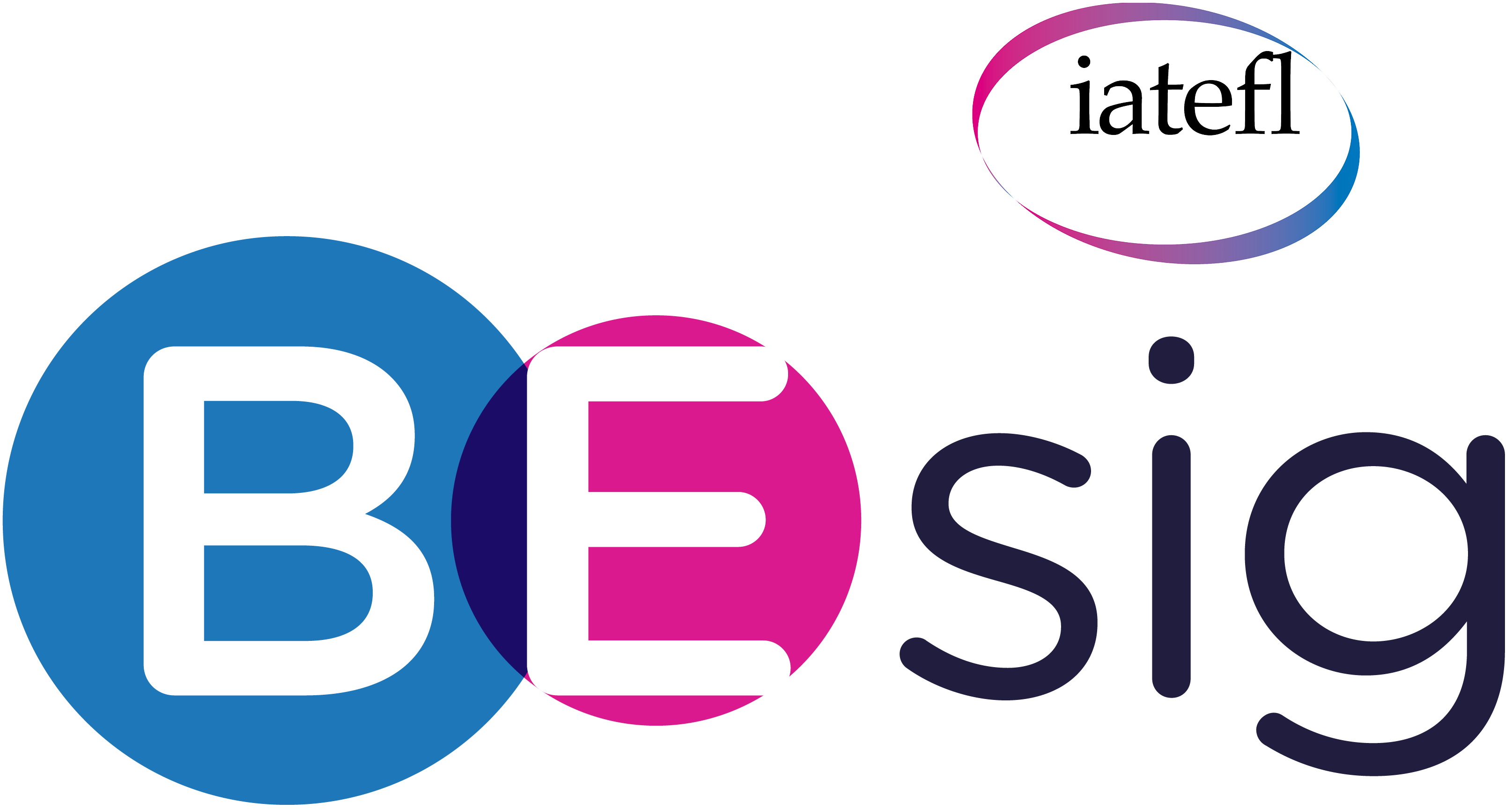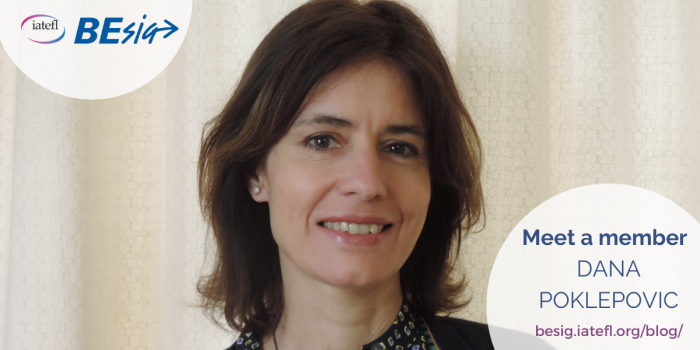
Sarah Plochl
This week’s interviewee is based in a city with a very active local teaching association. So what can BESIG offer her, I hear you ask? Read on as Sarah shares her experience and opinions about her local TA in comparison with BESIG and also to hear why she got involved as a volunteer.
Bio: Sarah is a trainer and DoS at English Language Institute. Originally from Hamburg and with an academic background in linguistics, Sarah started teaching eight years ago and has recently completed her Cambridge Delta diploma. She is also the chair of HELTA, Hamburg’s English Language Teaching Association. www.helta.de
Being based in Hamburg, which has an active local TA (teaching association), what benefits do you get from being a member of BESIG as well?
Input and inspiration! Our local TA is doing fantastic work, but we are by definition local and therefore limited in our scope and the size of our community. BESIG offers a chance to connect with a much greater number of people and to get a sense of the Business English teaching world as a whole. Last year’s conference was my first and I had a wonderful time. It reinvigorated my love for teaching and opened my eyes to how much more is still out there: new lesson ideas, potential materials to consider, intriguing notions about how to market myself, countless avenues for possible collaboration and mutual brain-picking. Also, it was nice to be just a delegate and not an organiser for a change!
Why did you get involved as a HELTA volunteer?
I became a member of HELTA about six years ago and got involved by a gradual process of osmosis: I suppose I’m one of those people who tend to hang back after events to help pick up, and so I was eventually asked if I wanted to help out, first as an assistant to the committee, then as a committee member, now as chair — finally fully absorbed!
I wanted to help out because I so relished the events HELTA was organising. Like many in-company trainers, I was lacking a staff room where teachers come together to talk shop, exchange ideas, build support systems (incidentally, is this even what happens in actual staff rooms?) HELTA offered a place to connect, and not just with any teachers, but with others who were curious and alert and willing to grow.
How have your various professional developments ventures helped you become a better business English teacher?
I’m quite certain that if I hadn’t started seeking out CPD (continual professional development) opportunities, I would have died of boredom or at the very least switched careers a long time ago. I find that when I do the same thing for too long, teach the same lesson too many times, hear myself explaining something with the same words over and over, I get annoyed with myself. I believe it’s essential to keep questioning the things we do and why we do them, as well as build our toolkits, both so that we can make sure we are worth our students’ time but just as importantly, so that we don’t tire of it! Thanks to CPD, fresh ideas from workshops and talking to colleagues, I cannot see myself getting bored with teaching anytime soon.
What is the business English scene in Hamburg like?
I have to admit I don’t have a good sense of the market and how it compares to other places in Germany and abroad. I’ve only ever worked here so my perspective is perhaps a little limited.
In terms of our clients, Hamburg is an international city and so for many people English is just a fact of life and taking lessons is not unusual. So there seems to be enough work going around, though I think we all suffer from having to offer ‘competitive rates’. As in most places, trainers of Business English charge for “English classes” when in fact the services we offer often more closely resemble the work of communication trainers, business consultants, life coaches, you name it! Maybe it’s time more Business English trainers found a way to set themselves apart and be bold enough to charge for the work they actually do and for stakeholders to stop pretending that all English classes are created equal.
Tell us about a challenging class or student you have taught and how you dealt with it/them.
The first one who comes to mind is this macho manager type last year who “just wanted to talk” and who soon seemed to find our weekly lessons a good opportunity to live out his evolving midlife crisis, always looking for ways to rile me up. In one of these conversations, he kept going on about what an impressive and capable person I was and how he simply couldn’t understand why I was “just a teacher”! The rest of our time together lasted exactly as long as it took me to explain to him exactly how inappropriate he had been and then to ask my boss to find him a different teacher.
I believe many of you will recognise this. The “just a teacher” comment, or upon learning we teach Business English, the similarly problematic “Oh, so not a real teacher then.” I don’t know exactly what it is that makes people say these things but I find that I have less and less patience for the implication that being a language teacher is either some sort of a stop-gap or a failure to have a proper career.
Why did you choose to attend the 2019 annual BESIG conference?
I had attended the IATEFL conference in Brighton the year before and while I thought it was a wonderful conference, I felt that many of the talks had a rather general pitch. Similarly, the people I met were from all over the world and teaching in all sorts of contexts and as stimulating and inspiring as it was to meet them, it did not feel like the event of a particular community but of a loosely associated network.
BESIG on the other hand looked like just the right size: not so small that it didn’t feature a line-up of impressive speakers, not so large that it was disorienting. And this was exactly my experience of the conference — just enough familiar faces to feel connected and be invited to meet new people, but not so many that it felt like my living room (which HELTA sometimes does!). Also, Berlin was just a ‘Katzensprung’ (German for a stone’s throw) away after all. I’m already looking forward to Warsaw this year.
How important is it for you to have a strong teacher network?
It’s important. I remember when I first started teaching (and I have to admit that while I had a linguistics degree and a wild and eclectic career of tutoring jobs under my belt, I was not a trained teacher) I didn’t go to workshops, hadn’t heard of HELTA or BESIG or IATEFL, probably wouldn’t have cared if I did! God knows what I was doing in the classroom back then but I seemed to be labouring under the illusion that I could ‘figure out’ teaching as I went along, copying pages from course books and coming up with ways to explain things as I went along… Needless to say, I know better now. I know that being a good teacher takes solid training (or a very determined autodidact) and that staying in touch with colleagues is the best thing we can do to continue to grow. Many colleagues have become friends, some I see as mentors, others perhaps cautionary tales. But all of them help me see where I’m at and I believe I’m a better teacher for it.
There are different areas in the BESIG team where you can apply your skills. We could use help in designing the newsletter, organising events, and promoting scholarships, to mention a few. If you are interested in volunteering for BESIG, send an email to: [email protected]
Questions by Mandy Welfare
Editing by Mike Canning
29th March 2020
MEET A MEMBER is available to IATEFL BESIG members and non-members alike but only features our current members. Another reason to join us and “BE with BESIG.”



